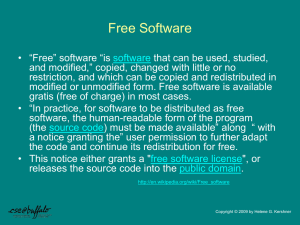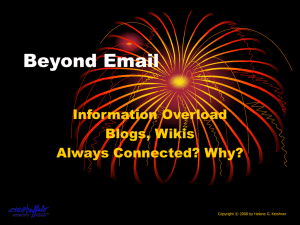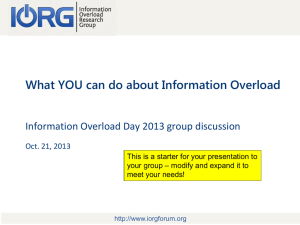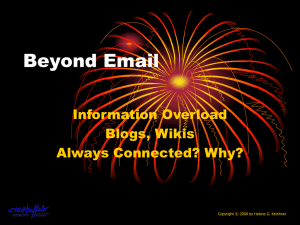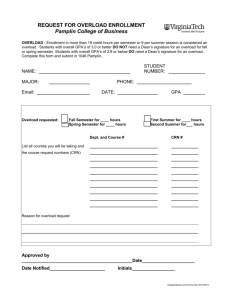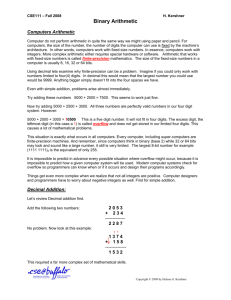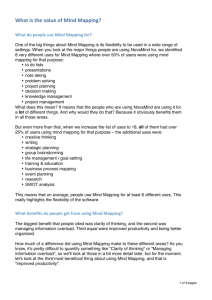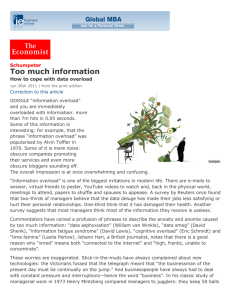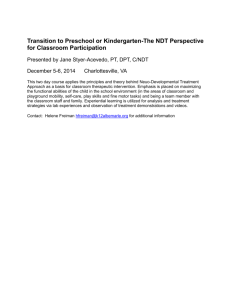Beyond Email
advertisement
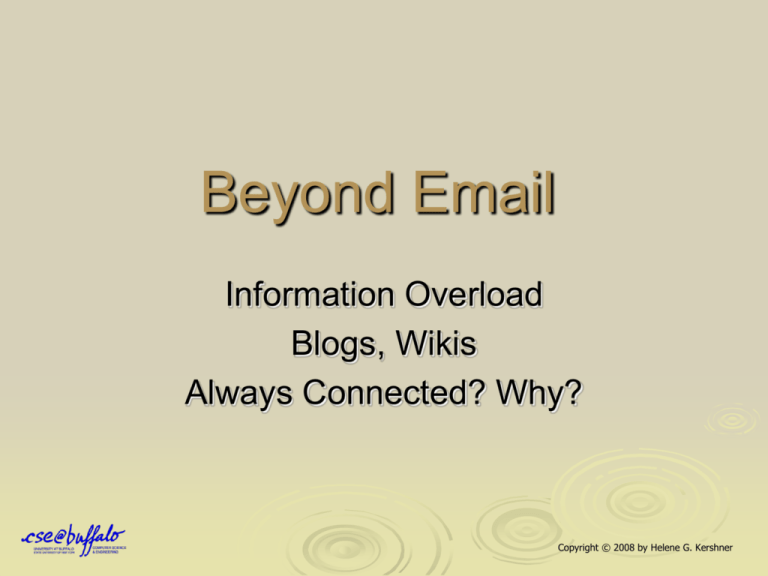
Beyond Email Information Overload Blogs, Wikis Always Connected? Why? Copyright © 2008 by Helene G. Kershner Beyond Email – Information Overload Can you have too much information? Copyright © 2008 by Helene G. Kershner Beyond Email – Information Overload Can you be “Too Busy to Notice You’re Too Busy”? Alex Eben Meyer http://www.nytimes.com/2007/03/31/business/31shortcuts.html?_r=1&oref=slogin Copyright © 2008 by Helene G. Kershner Beyond Email – Information Overload Google – type in “Information Overload” You get 1,800,000 hits An entire series of photos and cartoons are available to browse Research papers have been published from all over the world. There was more information, on information overload than I could actually manage Copyright © 2008 by Helene G. Kershner Beyond Email – Information Overload Is this the image of an Information Junkie? http://www.mathewingram.com/work/tag/cool/page/2/ Copyright © 2008 by Helene G. Kershner Beyond Email – Information Overload http://www.usg.edu/galileo/skills/unit08/credit08_01.phtml Copyright © 2008 by Helene G. Kershner Beyond Email – Information Overload Copyright © 2008 by Helene G. Kershner Beyond Email – Information Overload Know what you know Are you suffering from information overload? We develop technologies that enable access to your hidden knowledge and help you manage your data efficiently. http://www.kno10.com Copyright © 2008 by Helene G. Kershner Beyond Email – Information Overload http://pro.corbis.com/search/Enlargement.aspx?CID=isg&mediauid=DA083866-353A-4525-B3C29B86BE395F79 Copyright © 2008 by Helene G. Kershner Beyond Email – Information Overload Issue is mainstream when articles appear in New York Times Readers Digest Books about it available on Amazon Surviving Information Overload: The Clear, Practical Guide to Help You Stay on Top of What You Need to Know (Paperback) $11.04 http://www.amazon.com/exec/obidos/ASIN/031025115X/bookrags Copyright © 2008 by Helene G. Kershner Beyond Email – Information Overload Can there be too much information? Can there be too many books in a library Too many movies Too many music CDs Too many papers to read Too many web sites to visit Too many videos Copyright © 2008 by Helene G. Kershner Beyond Email – Information Overload Can there be too much information? “The Internet, as we know it, removed previous barriers to publication: the money required to buy a printing press or a transmitter or…” Before the Internet, “information” was limited but an unintended consequence was that the amount of information was also manageable. “The amount of stuff on the Internet is of a magnitude larger than any previous collection of any sort.” “We’re reaching the point where it’s too large to be effectively, searched, filed, indexed, briefed, organized, or numbered. But we still try.” Kantor, Andrew, http://www.usatoday.com/tech/columnist/andrewkantor/2007-06-14-internet-organization_N.htm Copyright © 2008 by Helene G. Kershner Beyond Email – Information Overload Can there be too much information? “Search tools dispense with categories and let users define their needs ad hoc.” Everything's in a pool Keywords narrow it down. Search tools have become less useful over the last few years “too much stuff to search” Without very, very careful categories a search results in hundreds of thousands of hits. New and better ways of searching the Web are needed. • Lots of ideas to make the searching more manageable • More specialized searching Tools like Wikipedia and it’s sister sites Copyright © 2008 by Helene G. Kershner Beyond Email – Information Overload Can we handle all our information Toys? First there was Email Then there was Email with SPAM Then there was Email with filters that filter some SPAM and well.. Then there was the Web Can we get through a day without checking key web sites • • • • • • • Class sites News sites Business sites Political sites Games sites Music sites Wikipedia Copyright © 2008 by Helene G. Kershner Beyond Email – Information Overload Enter My/Our World! Check Email (on multiple accounts) Check regular web sites Check Email Then my Palm (personal digital assistant –Ugh!) reminds me of a meeting or a class Attend meeting or class Then I get a text message, or a phone call or both Then of course there is my Email Then someone comes to my office Then of course there is my Email And somewhere in between, I try to get some work done. And the pattern repeats all day long Copyright © 2008 by Helene G. Kershner Beyond Email – Information Overload Can we handle all our information Toys? Workers in the “Information Age, need to develop skills for managing information overload.” This overload is caused by the “rapid rate of growth in the amount of information available” While days remain 24 hours long And our brains remain roughly the same as they were in caveman days. Krill, Pau, http://www.infoworld.com/articles/ca/xml/00/01/10/000110caoverload.html Copyright © 2008 by Helene G. Kershner Beyond Email – Information Overload Do we really need all these Toys? Do we need to be connected 24/7? Has all this information made us better – somehow? How much information is enough? You Tube: http://www.youtube.com/watch?v=YgW7or1TuFk Copyright © 2008 by Helene G. Kershner Beyond Email – Information Overload Headlines like these should scare us into thinking hard about Information Overload: Reuters Study Reveals Growing Danger Of Information Addiction Worldwide And A New Generation Of Dataholics (1997) Information could become the ‘drug of the nineties’ http://www.netaddiction.com/bio/reuters.htm Information Overload: Is There a Cure? (2008) Between meetings, mobile phones, e-mail and IM, we're failing victim to the stresses of daily business. Interruptions are here to stay. http://www.internetnews.com/bus-news/article.php/3737601 Is Information Overload a $650 Billion Drag on the Economy? (2007) an estimate of the “cost of unnecessary interruptions” http://bits.blogs.nytimes.com/2007/12/20/is-information-overload-a-650-billion-drag-on-the-economy/ Copyright © 2008 by Helene G. Kershner Beyond Email – Information Overload Technology isn’t the solution to everything? We need to set limits and boundaries. “Key to information management is focusing on the quality of the data your receive.” Recognizing quality is hard Who do you believe? Alan Lightman, an MIT humanities professor and physics lecturer said, “ I think that the high-speed information technologies, while very useful in many ways, have robbed us of our necessary silences of time to reflect on values on who we are and where we’re going.” Krill, Pau, http://www.infoworld.com/articles/ca/xml/00/01/10/000110caoverload.html Copyright © 2008 by Helene G. Kershner Beyond Email – Information Overload Ways to beat back the overload Do Develop an information management plan that works for you. Filter information. Recognize that you cannot possible look at all relevant data before you make a decision. Attempt to recognize quality data. Take control. Create “down” time Don't Let information take control of you by working 60 to 70 hours per week. Take cell phones or computers on vacations. Attempt to examine every piece of data available. Focus on things beyond your control, such as the idea that every minute there is more and more information out there….. Krill, Pau, http://www.infoworld.com/articles/ca/xml/00/01/10/000110caoverload.html Copyright © 2008 by Helene G. Kershner Beyond Email Organizing Information might be a way past Information Overload! Wikis Blogs Copyright © 2008 by Helene G. Kershner Beyond Email – Collaboration Wikis So what’s a Wiki? http://en.wikipedia.org Great Idea: “A wiki is software that allows registered users or anyone to collaboratively create, edit, link, and organize the content of a website, usually for reference material. “ Wikis are collaborative websites and are often used as a way to keep data on community websites up-to-date. Wikipedia is the best known wiki. Wikis are used by businesses on intranets as a way of managing information (reducing information overload). Ward Cunningham developed the first wiki originally described it as “the simplest online database that would possibly work.” http://en.wikipedia.org/wiki/Wiki Copyright © 2008 by Helene G. Kershner Beyond Email – Collaboration Wikis Wikis are for collaborative writing Groups of individuals, anywhere, working together in a written, web format Website is hosted making it available to users Can be a collection of connected sites, and hyperlinked documents “A wiki is essentially a database for creating, browsing and searching through information.” (Leuf, Bo. & Cunningham, Ward, The Wiki Way: Quick Collaboration on the Web., 2001) Easy to create, easy to edit, easy to update NOT reviewed by anyone other than the users Kids in High School and Middle School create group projects using wikis • It is an easy way to comment on and enhance each others work Copyright © 2008 by Helene G. Kershner Beyond Email – Collaboration Wikis Public Wikis Private Wikis Public group forums for sharing information Usually require user accounts and special logins so everyone in the wikis’ community knows who is changing the material Edits are in real-time and instantly appear on the web making it possible for unhappy users to abuse the wiki. Some public wikis (ex: wikipedia) have a site moderator who can lock down abused sites. Often require user authentication to edit and change pages Can be hosted on systems not directly on the Internet but only on a local Intranet Check out: http://www.wikispaces.com/ Copyright © 2008 by Helene G. Kershner Beyond Email -- Blogs Great Idea: A blog (an abridgment of the term web log) is a website, usually maintained by an individual, with regular entries of commentary, descriptions of events, or other material such as graphics or video. Entries are commonly displayed in reverse chronological order. "Blog" can also be used as a verb, meaning to maintain or add content to a blog A software environment that runs as a web page http://en.wikipedia.org/wiki/Blog Copyright © 2008 by Helene G. Kershner Beyond Email -- Blogs Blogs are online diaries Can provide news and commentary on events Often include text, pictures and sometimes video Readers can comment on what the blogger reports Unlike a wiki, readers cannot change the bloggers content Copyright © 2008 by Helene G. Kershner Beyond Email -- Blogs Blogs come in all shapes and sizes and cover all topics NY Times, and other media outlets, has blogs where the newspaper can report and receive comments from readers • http://www.nytimes.com/ref/topnews/blog-index.html Personal Blogs Corporations have blogs to increase communication and disseminate information By “readership”: education blogs, political blogs, travel blogs, movie blogs, fashion blogs, you name it there’s a blog for it. • Dilbert Bolg http://dilbertblog.typepad.com/ • The Facebook Blog http://blog.facebook.com/ Copyright © 2008 by Helene G. Kershner Beyond Email -- Blogs Copyright © 2008 by Helene G. Kershner Beyond Email -- Blogs There are free blogger sites: https://www.blogger.com/start How do we know our content is secure? How do we know where to host a blog? • Review of Blogging sites: http://hosting-review.com/?gclid=CLjmx8z34pICFQNEPAod4SWSdw • Gaggle, Launches Safe Blogging site for Schools and Students. http://www.cheaphostingdirectory.com/news-blog-website-gagglelaunches-safe-blogging-site-for-schools-and-students-1926.html Copyright © 2008 by Helene G. Kershner Beyond Email Information Overload is a part of our lives Whether we embrace it or not, it is here to stay There is some value in being disconnected for some period of time, each day, each week, each…. Wikis and Blogs Help us organize our information But what we say and how we say it can then become who we are forever, and for every one. Data can haunt us or help us or both Finding Balance is the critical question Copyright © 2008 by Helene G. Kershner
